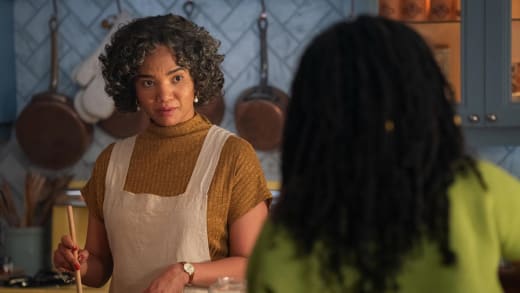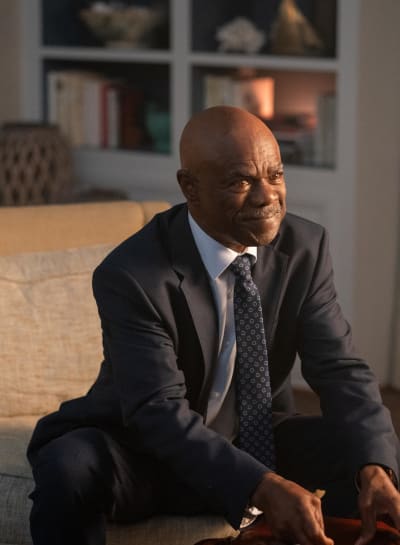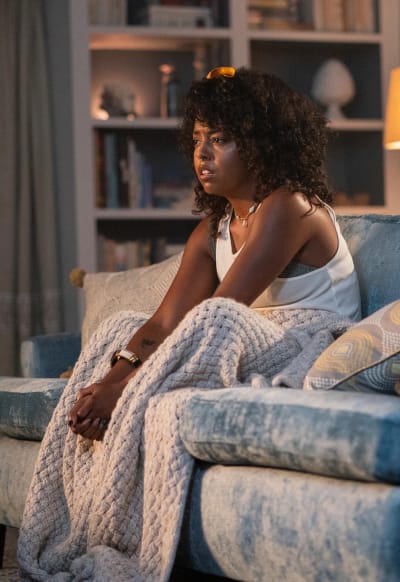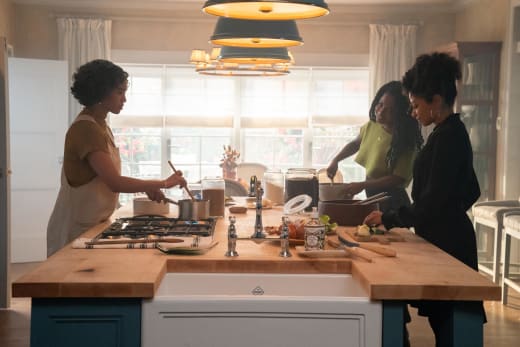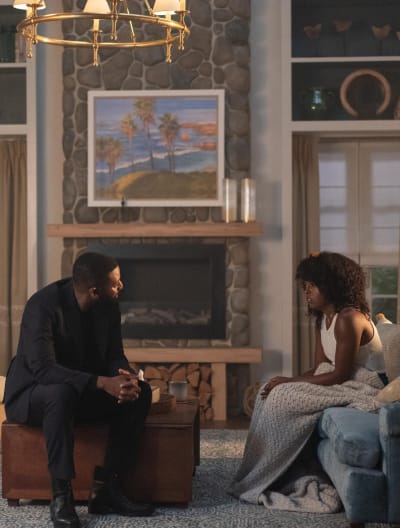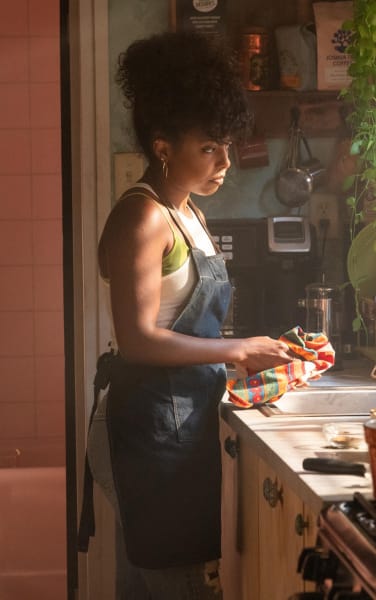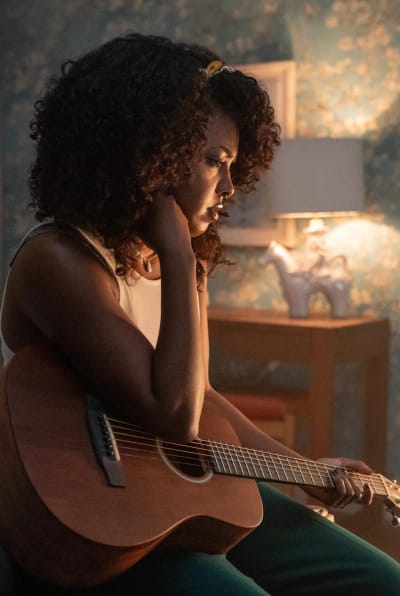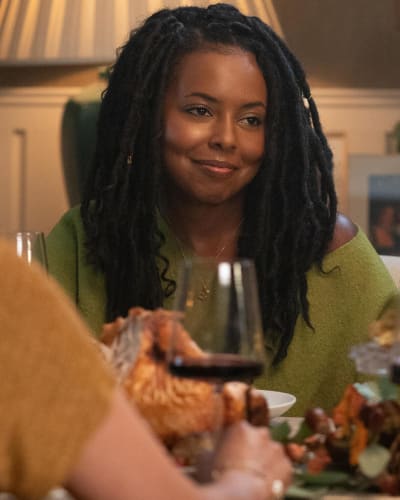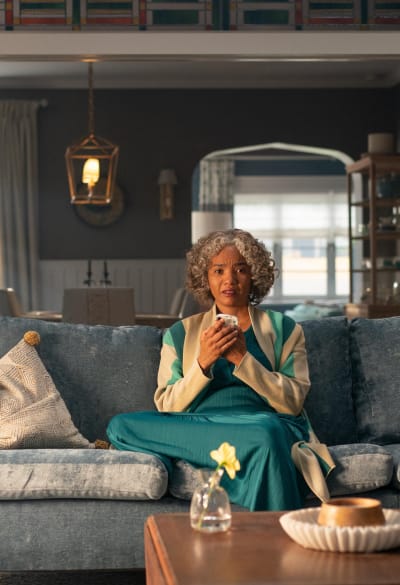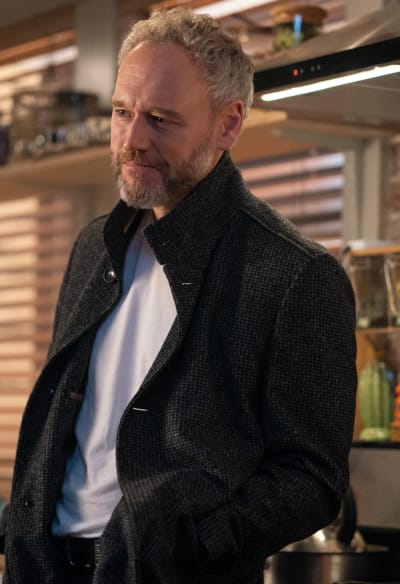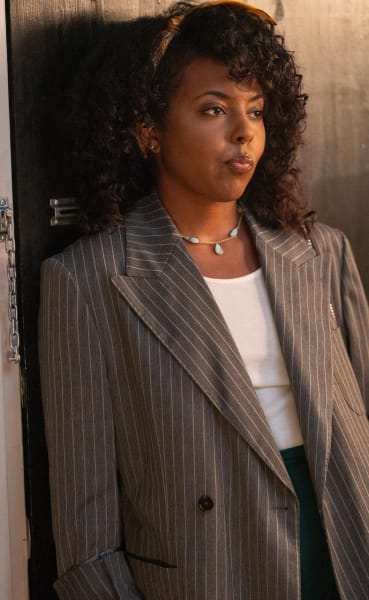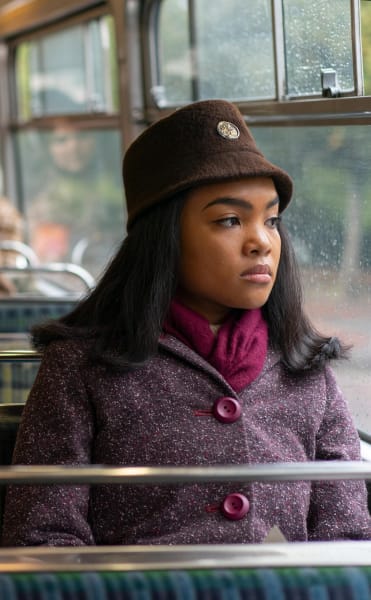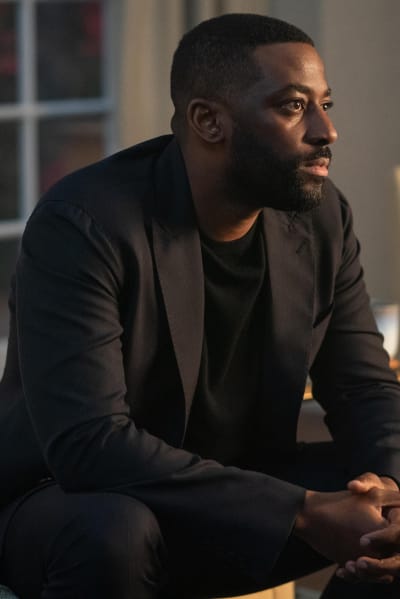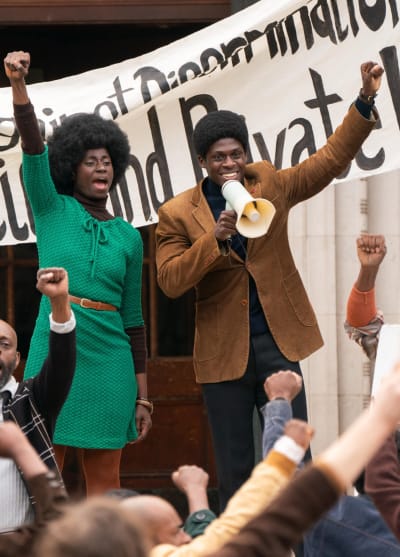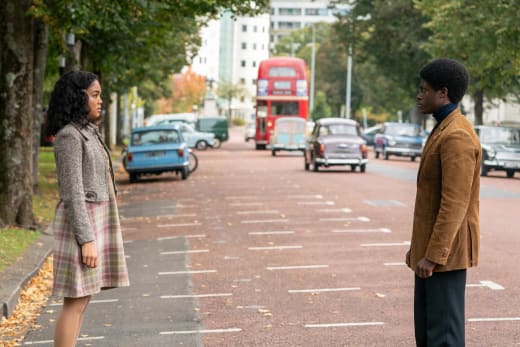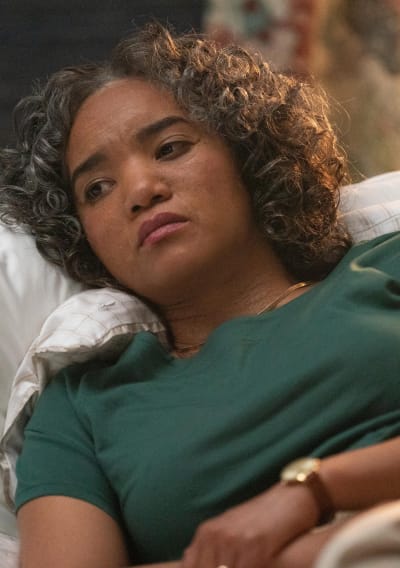It was an hour that centered the most on the Bennett women.
We’ve experienced so much of Covey’s story in the past that it was time to focus a bit on the family narrative closest to the present.
Black Cake Season 1 Episode 4 shifted much of its focus to giving us more insight into Benny and what happened that fateful Thanksgiving, which changed everything.
By the end of the hour, it was evident that the Bennett women are alike and have a knack for holding onto secrets and carrying the weight of their choices.
The installment also introduced us to peripheral but narratively influential characters with the Bennett siblings’ spouses, Steve and Lynette.
We got to know Covey well enough, so it made sense that the story would branch into another direction so we could gain some traction on the Bennett siblings and flesh them out.
Even after delving into Benny’s story more so we can better understand how she clicks, not to mention Adrienne Warren pulling off so much emotional work, there’s still a detachment to Benny.
Moreover, there’s an irritation with the character.
What should’ve most likely revealed a compelling individual with a sympathetic background instead gave way to a petulant woman and, at times, overly emotional and unreasonable person.
Warren is wildly expressive and carries so many emotional scenes well enough, but Benny is simply frustrating.
She was more interesting as a character when she was reacting to learning more about her parents’ story. However, delving into her own only generated irritation with this young woman who couldn’t communicate like an adult and lived to regret it.
I wish I had the courage to share with you sooner because it’s what all three of my children deserve.
Eleanor
It’s not uncommon for kids to feel drastically different about their childhood and family dynamics than others in said family. I don’t know anyone who doesn’t experience some misgivings about their version of where they stand in their family compared to others.
But Benny Bennett casually making herself a victim within the Bennett family because she didn’t feel “understood” and then bailing on them for eight years was unfathomable.
Even when we finally saw the events surrounding those choices, it remained incomprehensible and didn’t garner the character much favor.
She often spoke about fearing the judgment of her family and mentioned that she was some outcast. On top of that, she had a perfectly understandable fear of coming out as queer to her parents.
The latter is something that she should’ve done in her own time when she felt ready, but she rushed because of her relationship with Joanie.
But mostly, she had these strong feelings about being surrounded by a family she felt took the wind out of her sails at every turn, and even if that was the case, it didn’t feel like Benny handled any of that well or in a healthy manner.
Her nervousness over bringing Joanie to Thanksgiving dinner was reasonable, and it was natural for her to feel on edge about how her father felt about her sexuality.
And there were some hints of things beneath the surface that highlighted Bert’s feelings about the matter. But it also felt apparent that his love for his daughter would outweigh however long it took for him to grasp her sexuality.
I wish now that I had listened to your father. Maybe if I had shared my secrets, Benny, it could’ve brought us closer. Maybe it would’ve kept you away from flying away that Thanksgiving.
Eleanor Voiceover
He and Eleanor Bennett welcomed Joanie into their home with ease and genuinely supported this change, and they were probably still trying to adjust to this news.
They were perfectly polite and hospitable to Joanie, never once implied that they should keep their PDA to a minimum, and were doing well all around.
But somewhere along the way, a fight was picked, and it started to feel like Benny was a young kid throwing a tantrum at the dinner table.
It does suck that Bert and Eleanor didn’t support Benny’s desire to become an artist and pushed her into other things.
It’s also not something that any other parent wouldn’t have done. It’s such a common maneuver when anyone opts to go into the arts that it hardly seems like something that would result in nearly a decade-long estrangement.
If Bert was footing the bill for the many things and studies Benny pursued, only for her never to complete any of it or move on to something new, his frustrations are warranted.
Even if Benny wanted to pursue painting, it probably wouldn’t have hurt to finish culinary school, for example, to have a backup or something to sustain herself while she was making art.
Yes, Bert’s line that called Benny out for being flaky and indecisive and never knowing what she wanted was definitely a dig at her sexuality.
Bi/Pan individuals, in particular, face those digs often as there’s all this emphasis on “picking a side” to appease those who can’t grasp the concept of not feeling compelled to do that.
In some ways, they may have played things too subtle when attempting to explore a Black queer person’s experience with coming out to family and the tensions and complexities that arise with that.
It almost felt as if they didn’t want anyone to come across as the “bad guy,” so Black Cake doesn’t get to delve into that perspective but instead ticks it off a box.
Bunny felt as if she had more at stake, and it was an untold story, which was unfortunate.
Yet it was easy to understand Bert’s perspective as a father and an immigrant who knows how hard it was for him and Eleanor to start a life together in a whole new world.
Benny didn’t speak of anything with absolute conviction.
If there were any doubts about how the lack of accountability or ownership came into play after that blowup with her father that she initiated when it wasn’t warranted, she lashed out at Joanie for “making her” out herself to her parents.
Then she left the poor woman there to figure out how to get home.
She had such childish reactions to everything. It cost her a relationship with a lovely woman who loved and wanted the best for her and years with her father and mother.
How could ma have had Bunny in her life? How could she have gone through so much with her and let Dad be so judgmental with me?
Benny
I’m sorry, I couldn’t feel bad for Benny Bennett after seeing more of her story regarding how she left her loving family.
She missed out on two years of being with her father before he died because she thought he was homophobic and treated her poorly instead of recognizing how little their issues had to do with her sexuality and how much they revolved around character flaws that she needed to work on.
And it was one thing for her to punish her father for two years and have it backfired when he died suddenly. But then she never bothered to return in the six years since his death.
It’s hard to put any type of decent spin on that to justify it.
You would think her guilt over her father would encourage her to squash things with her mother, but she didn’t do that either. And she left Byron alone to deal with it all by himself.
Ironically, and sadly, Benny’s craving for validation led her straight into the arms of an abusive jerk who saw her as easy prey.
It wasn’t that surprising that Benny would fall so easily for a successful artist who validated her as a woman and artist, at least in the beginning.
He gave her precisely what she desired most, building a bond with him that remains complicated and hard to untangle.
Steve: Have you ever worn your hair any other way?
Benny: Like how?
Steve: I don’t know, more feminine.
Steve is such a classic, textbook abuser, starting with the constant love bombing, then gaslighting Benny and ensuring that she stays isolated away from others so that she’s solely dependent on him.
Of course, all of that eased into physical violence, and the next thing you know, she couldn’t even show up at her father’s funeral because she was too afraid about others seeing her bruises.
Steve still has a disturbing hold on her, and there’s so much to unpack regarding the power dynamic of their relationship, not only with him as a man who wields his reputation, money, and more to control her.
It’s also difficult to watch because of the racial component. Steve fetishized her, then inserted racial microaggressions that had her changing everything she was, stripping her of her identity and Blackness for the sake of their relationship and keeping her in a submissive role beholden to him.
He wouldn’t even consider any of his actions as innately racial, either.
When you consider everything that Covey Lincook went through to get to the States and start this life, it makes you sad that she risked everything for this family so that her kids could have a better life.
Nevertheless, generational trauma has a way of rearing its ugly head regardless. The touchstone aspect of how tenuous things can be with interracial relationships and how the intersection of gender within that is fascinating.
Lin was a complex man who loved his daughter and had loved Mathilda, too, but we know he’d used slurs before when speaking about her despite that love.
I walked away from my father, and my mother walked away from me. Betrayal is a powerful thing, and I’d rather suffer in silence than risk losing our children.
Eleanor
It’s something Covey bore witness to and had to reconcile with, and how it made her feel as a biracial girl.
Decades later, she has this impressionable, vulnerable daughter subjected to this type of racism and misogyny combined in an abusive relationship with a more powerful white man who claimed to love her.
I’m relieved Benny could open up to her brother, Byron Bennett, and share the truth with him. He handled that and her apology well.
But there’s no ease until Steve is out of town and hundreds of miles away, assuming there’s no reason for him not to be in prison.
Byron’s partner, Lynette, had less presence than Steve, given the focus of the hour.
But she was the one to encourage him to advocate for himself in the workplace, even if she overstepped by bringing his parents into it.
Byron does seem like he’s too passive, which must be a stark contrast to Gibbs.
He and Lynette appear to be a happy couple, and it’s good that she challenges him. He probably needs that and couldn’t get far without it.
But it felt lost in the rest of what was going on throughout the hour.
Covey Lincook’s story remains the arc that keeps you glued to the screen most.
Getting to see the transition from Covey to Eleanor, even within this hour, which gave Chipo Chung much more to do, and beautifully, was such a highlight.
Everything about Covey’s journey has been about taking chances and making choices.
She took a chance when she crossed the streets of London, and she and Gibbs reunited.
Gibbs: have you thought of me?
Covey: Gibbs, thinking of you has been my escape, a reminder of who I was, who I am; you’re my one and only. You always will be.
She learned that he loved her enough to give up everything for her.
They really have the greatest, most endearing, and enduring love story.
It was so touching to see them flee London and start a whole new life together under these different identities.
And it was great to have those family moments that gave us a glimpse of what growing up in the Bennett household was like, full of laughter and love.
Of course, the past always slips in, so Burt slipping up and calling Eleanor “Covey” was such a great moment.
Hopefully, we’ll dive back into more of Covey and Gibbs’ life after they reunited in their youth and how they navigated things.
It seems, with Eleanor’s final admission that she had three kids and not two, that we’ll get more of that after all, which is a relief.
Mia Isaac dazzles, and Black Cake is at its best when it centers on her and Covey.
We may not be able to go back, but we can go forward together. Marry me, Covey, and I promise you that you’ll never carry your secrets alone.
Gibbs
Over to you, Black Cake Fanatics. How do you feel about Benny’s story? Were you shocked that Gibbs and Bert were the same person? Hit the comments with your thoughts.
Black Cake streams on Wednesdays on Hulu!
Jasmine Blu is a senior staff writer for TV Fanatic. She is an insomniac who spends late nights and early mornings binge-watching way too many shows and binge-drinking way too much tea. Her eclectic taste makes her an unpredictable viewer with an appreciation for complex characters, diverse representation, dynamic duos, compelling stories, and guilty pleasures. You’ll definitely find her obsessively live-tweeting, waxing poetic, and chatting up fellow Fanatics and readers. Follow her on X.
